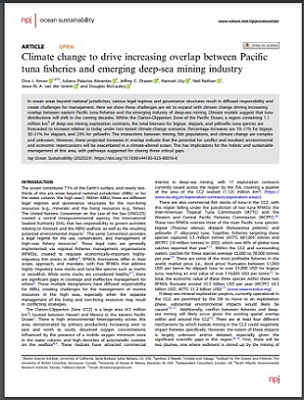
In ocean areas beyond national jurisdiction, various legal regimes and governance structures result in diffused responsibility and create challenges for management. Here we show those challenges are set to expand with climate change driving increasing overlap between eastern Pacific tuna fisheries and the emerging industry of deep-sea mining. Climate models suggest that tuna distributions will shift in the coming decades. Within the Clarion-Clipperton Zone of the Pacific Ocean, a region containing 1.1 million km2 of deep-sea mining exploration contracts, the total biomass for bigeye, skipjack, and yellowfin tuna species are forecasted to increase relative to today under two tested climate-change scenarios. Percentage increases are 10–11% for bigeye, 30–31% for skipjack, and 23% for yellowfin. The interactions between mining, fish populations, and climate change are complex and unknown. However, these projected increases in overlap indicate that the potential for conflict and resultant environmental and economic repercussions will be exacerbated in a climate-altered ocean. This has implications for the holistic and sustainable management of this area, with pathways suggested for closing these critical gaps.













